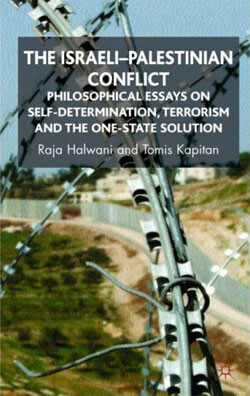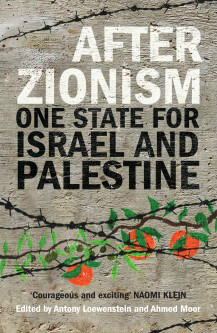The Electronic Intifada 18 June 2008

Some potential readers may be deterred by the adjective “philosophical,” which could without disadvantage have been omitted from the subtitle. While the reader’s concentration is tested by subtle and detailed argumentation, no former acquaintance with philosophical traditions or terminology is required, and abstractions are invariably confronted with their material consequences in everyday political reality. More opinionated readers may feel that, in the authors’ terms, “philosophical discussion of these [normative] questions, especially when applied to particular political conflicts, is hopelessly inconclusive.” However, the authors are surely correct in maintaining that “No legal system is the final word about how humans and societies ought to behave, and to restrict normative thought to enactment would immunize positive law from rational evaluation.”
The philosophers most frequently mentioned in this book come from Anglo-American schools of liberal and analytic philosophy. On the whole it must be said that they have failed miserably to take Palestine into account when reflecting on questions of political ethics. Typical here are the Brit Michael Dummett, whose book On Immigration and Refugees (2001) nowhere mentions Palestinians, the largest refugee community of all, and the American Michael Walzer whose Spheres of Justice (1983) also discusses refugees at length without mentioning Palestinians. While our authors are too polite to comment on these flagrant omissions, the phrases “moral cowardice,” “intellectual dishonesty,” and trahison des clercs come irresistibly to mind.
The odd-numbered chapters of The Israeli-Palestinian Conflict, on “Self-Determination” and “Terrorism,” are by Kapitan; the even-numbered ones, on “The Right of Return” and “The One-State Solution,” by Halwani. It is logical that the one-state solution should come at the end, as its implementation is seen by both authors (and, incidentally, by a growing number of concerned people worldwide) as the only acceptable resolution of many of the issues raised.
For example, in discussing self-determination Kapitan usefully seeks to cut a number of Gordian knots by advocating a regional rather than national interpretation of this thorny concept. “This is not to accord a right to Palestinian Arabs that Israeli Jews lack; the principle does not grant the Palestinian people as such a right of self-determination any more than it grants to Jews sovereignty over Palestine qua Jews … the regional interpretation … confers the right of self-determination upon the totality of legitimate residents, however else they might be characterized.” In the final chapter, Halwani cites this argument and adds: “All the segments of the entire population … share in the right to self-determination. The one-state solution satisfies this right by allowing members of both groups to exercise determination over historic Palestine.”
Incidentally, Kapitan’s thinking in Chapter 1 might be adduced as a response to Michael Neumann’s dismissal of the principle of self-determination in his The Case against Israel: “There is no right of self-determination of peoples. The whole idea is a bad one.” Given that Neumann is one of the few North American philosophers to have concerned himself directly and forcefully with the Palestine issue, and that he is at odds with our authors on various points, it would have been useful — and indeed exemplary, given the rarity with which texts on Palestine connect with one another — had they chosen to engage specifically with his ideas in their book (The Case against Israel turns up in the bibliography, but Neumann isn’t otherwise mentioned). Noam Chomsky’s recent apostasy on such questions as the boycott, the one-state solution and the Israel lobby also merit philosophical discussion, but do not receive it here.
On the question of “terrorism” Kapitan is closer to Neumann (and indeed Ted Honderich, who has written notoriously that “the Palestinians have had a moral right to their terrorism”) who refuses to “pronounce judgment on Palestinian terrorism because I do not, God-like, have all the facts on the ground at my disposal.” Kapitan instances three grounds tending to prove that “retaliatory terrorism against those who pose a radical existential threat is morally justifiable.” Firstly, the right of self-defense may be taken to include acts of retaliation having “too great a deterrence value to warrant their suspension in the absence of a reasonable hope of success of ending or reducing a particular existential threat.” Secondly, the acquisition by any state of near-absolute power would leave only terrorism as a means of retaliation. Thirdly, in the face of “a humiliating unjustified annihilation of oneself … without the power of retaliation,” terrorism “can be a valuable means for reducing misery and retaining dignity while enduring the threat of destruction, before the twilight falls.”
Many of the most dedicated defenders of the Palestinian cause will be uneasy with these arguments, which I must stress are hedged around with qualifications. Personally, I would like to see a close analysis of the phrases “morally justifiable” and “moral right.” Is the “morality” here the same as that which, referring to the “morally optimum” one-state solution, provides the book’s last words: “when morality calls, we must heed it”? And is absolute powerlessness a more acceptable ground (“morally” or otherwise) than absolute power for setting civilian life at naught? In these instances, perhaps the book would have benefited from being a little more pedantic in its attention to philosophical detail — but Kapitan might well reply: over to you — refute me!
Clearly these are all questions that apply beyond the immediate issue of Palestine, e.g. to Tibet, Sri Lanka, or Kosovo. This factor adds to the book’s wealth of relevance, which is enhanced by the judicious absence of a polemical tone — an almost impossible feat in this context. While the conclusions drawn by Kapitan and Halwani strongly favor the pro-Palestinian point of view, the arguments are set out with such clarity and circumstantial minuteness that there is considerable scope for disagreement and debate — as much from the pro-Palestinian as pro-Israeli point of view.
Sadly, such debate is unlikely to take place. What is called “debate” in the context of the Israel-Palestine conflict is invariably a venomous mixture of aggression and defensiveness generating infinite amounts of heat on either side of an insuperable wall. Kapitan and Halwani have written a book that deserves to be on university syllabuses, and that should be equally mandatory for anyone with an interest in either side of the conflict.
Raymond Deane is a composer and political activist based in Ireland and Germany.
Related Links





